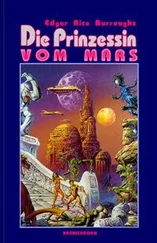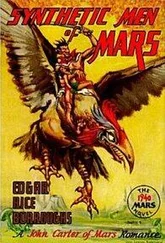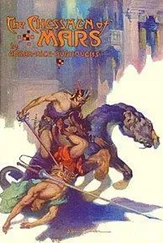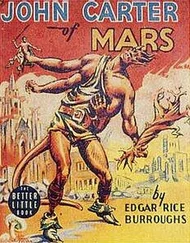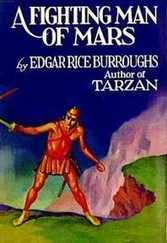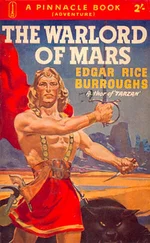Edgar Burroughs - Swords of Mars
Здесь есть возможность читать онлайн «Edgar Burroughs - Swords of Mars» весь текст электронной книги совершенно бесплатно (целиком полную версию без сокращений). В некоторых случаях можно слушать аудио, скачать через торрент в формате fb2 и присутствует краткое содержание. Жанр: Боевая фантастика, на английском языке. Описание произведения, (предисловие) а так же отзывы посетителей доступны на портале библиотеки ЛибКат.
- Название:Swords of Mars
- Автор:
- Жанр:
- Год:неизвестен
- ISBN:нет данных
- Рейтинг книги:4 / 5. Голосов: 1
-
Избранное:Добавить в избранное
- Отзывы:
-
Ваша оценка:
- 80
- 1
- 2
- 3
- 4
- 5
Swords of Mars: краткое содержание, описание и аннотация
Предлагаем к чтению аннотацию, описание, краткое содержание или предисловие (зависит от того, что написал сам автор книги «Swords of Mars»). Если вы не нашли необходимую информацию о книге — напишите в комментариях, мы постараемся отыскать её.
Swords of Mars — читать онлайн бесплатно полную книгу (весь текст) целиком
Ниже представлен текст книги, разбитый по страницам. Система сохранения места последней прочитанной страницы, позволяет с удобством читать онлайн бесплатно книгу «Swords of Mars», без необходимости каждый раз заново искать на чём Вы остановились. Поставьте закладку, и сможете в любой момент перейти на страницу, на которой закончили чтение.
Интервал:
Закладка:
“What of last night?” he asked. “What luck did you have? I see that you are here alive; so I take it that you did not succeed in reaching the meeting-place of the assassins.”
“On the contrary, I did,” I told him. “I was in the room next to them and saw them all.”
“What did you learn?”
“Not much. When the door was closed, I could hear nothing. It was open only a short time.”
“What did you hear while it was open?” he asked.
“They knew that you had employed me as your bodyguard.”
“What!” he demanded. “How could they have known that?”
I shook my head. “There must be a leak,” I told him.
“A traitor!” he exclaimed.
I did not tell him about Rapas. I was afraid that he would have him killed, and I did not want him killed while he might be of use to me.
“What else did you hear?” he demanded.
“Ur Jan ordered that I be killed.”
“You must be careful,” said Fal Sivas. “Perhaps you had better not go out again at night.”
“I can take care of myself,” I replied, “and I can be of more service if I can get about at night and talk to people on the outside than I can by remaining cooped up here when I am off duty.”
He nodded. “I guess you are right,” he said, and then for a moment he sat in deep thought. Finally he raised his head. “I have it!” he exclaimed. “I know who the traitor is.”
“Yes?” I asked politely.
“It is Rapas the Ulsio—Ulsio! He is well named.”
“You are sure?” I asked.
“It could be no one else,” replied Fal Sivas emphatically. “No one else has left the premises but you two since you came. But we will put an end to that as soon as he returns. When he comes back, you will destroy him. Do you understand?”
I nodded.
“It is a command,” he said; “see that it is obeyed.” For some time he sat in silence, and I could see that he was studying me intently. At last he spoke.
“You have a smattering of the sciences I judge from the fact of your interest in the books in your quarters.”
“Only a smattering,” I assured him.
“I need such a man as you,” he said, “if I could only find someone whom I might trust. But who can one trust?” He seemed to be thinking aloud. “I am seldom wrong,” he continued musingly. “I read Rapas like a book. I knew that he was mean and ignorant and at heart a traitor.”
He wheeled suddenly upon me. “But you are different. I believe that I can take a chance with you, but if you fail me—” he stood up and faced me, and I never saw such a malevolent expression upon a human face before. “If you fail me, Vandor, you shall die such a death as only the mind of Fal Sivas can conceive.”
I could not help but smile. “I can die but once,” I said.
“But you can be a long time at the dying, if it is done scientifically.” But now he had relaxed, and his tone was a little bantering. I could imagine that Fal Sivas might enjoy seeing an enemy die horribly.
“I am going to take you into my confidence—a little just a little,” he said.
“Remember that I have not asked it,” I replied, “that I have not sought to learn any of your secrets.”
“The risk will be mutual,” he said, “your life against my secrets. Come, I have something to show you.”
He led me from the room, along the corridor past my quarters, and up the ramp to the forbidden level above. Here we passed through a magnificently appointed suite of living quarters and then through a little door hidden behind hangings, and came at last into an enormous loft that extended upward to the roof of the building, evidently several levels above us.
Supported by scaffolding and occupying nearly the entire length of the enormous chamber, was the strangest looking craft that I have ever seen. The nose was ellipsoidal; and from the greatest diameter of the craft, which was just back of the nose, it sloped gradually to a point at the stern.
“There it is,” said Fal Sivas, proudly; “the work of a lifetime, and almost completed.”
“An entirely new type of ship,” I commented. “In what respect is it superior to present types?”
“It is built to achieve results that no other ship can achieve,” replied Fal Sivas. “It is designed to attain speed beyond the wildest imaginings of man. It will travel routes that no man or ship has ever traveled.
“In that craft, Vandor, I can visit Thuria and Cluros. I can travel the far reaches of space to other planets.”
“Marvellous,” I said.
“But that is not all. You see that it is built for speed. I can assure you that it is built to withstand the most terrific pressure, that it is insulated against the extremes of heat and cold. Perhaps, Vandor, other inventors could have accomplished the same end. In fact, I believe Gar Nal has already done so, but there is only one man upon Barsoom, doubtless there is only one brain in the entire Solar System, that could have done what Fal Sivas has done. I have given that seemingly insensate mechanism a brain with which to think. I have perfected my mechanical brain, Vandor, and with just a little more time, just a few refinements, I can send this ship out alone; and it will go where I wish it to go and come back again.
“Doubtless, you think that impossible. You think Fal Sivas is mad; but look! Watch closely.”
He centered his gaze upon the nose of the strange-looking craft, and presently I saw it rise slowly from its scaffolding for about ten feet and hang there poised in mid-air. Then it elevated its nose a few feet, and then its tail, and finally it settled again and rested evenly upon its scaffolding.
I was certainly astonished. Never in all my life had I seen anything so marvellous, nor did I seek to hide my admiration from Fal Sivas.
“You see,” he said, “I did not even have to speak to it. The mechanical mind that I have installed in the ship responds to thought waves. I merely have to impart to it the impulse of the thought that I wish it to act upon. The mechanical brain then functions precisely as my brain would, and directs the mechanism that operates the craft precisely as the brain of the pilot would direct his hand to move levers, press buttons, open or close throttles.
“Vandor, it has been a long and terrible battle that I have had to wage to perfect this marvellous mechanism. I have been compelled to do things which would revolt the finer sensibilities of mankind; but I believe that it has all been well worthwhile. I believe that my greatest achievement warrants all that it has cost in lives and suffering.
“I, too, have paid a price. It has taken something out of me that can never be replaced. I believe, Vandor, that it has robbed me of every human instinct. Except that I am mortal, I am as much a creature of cold insensate formulas as that thing which you see resting there before you. Sometimes, because of that, I hate it; and yet I would die for it. I would see others die for it, countless others, in the future, as I have in the past. It must live. It is the greatest achievement of the human mind.”
VI. The Ship
Every one of us, I believe, is possessed of two characters. Oftentimes they are so much alike that this duality is not noticeable, but again there is a divergence so great that we have the phenomenon of a Dr. Jekyll and Mr. Hyde in a single individual. The brief illuminating self-revealment of Fal Sivas suggested that he might be an example of such wide divergence in character.
He seemed immediately to regret this emotional outburst and turned again to an explanation of his invention.
“Would you like to see the inside of it?” he asked.
“Very much,” I replied.
He concentrated his attention again upon the nose of the ship, and presently a door in its side opened and a rope ladder was lowered to the floor of the room.
Читать дальшеИнтервал:
Закладка:
Похожие книги на «Swords of Mars»
Представляем Вашему вниманию похожие книги на «Swords of Mars» списком для выбора. Мы отобрали схожую по названию и смыслу литературу в надежде предоставить читателям больше вариантов отыскать новые, интересные, ещё непрочитанные произведения.
Обсуждение, отзывы о книге «Swords of Mars» и просто собственные мнения читателей. Оставьте ваши комментарии, напишите, что Вы думаете о произведении, его смысле или главных героях. Укажите что конкретно понравилось, а что нет, и почему Вы так считаете.



